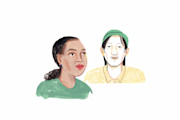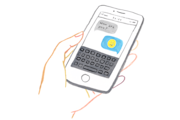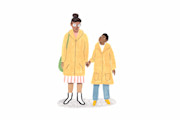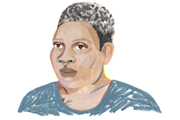For many of us, when we decided to have children, the idea that there would be a time with no school, no daycare, and no extended family support—for an entire year—was unfathomable. Could we imagine that we’d have to decide between childcare and the safety of our friends and loved ones?
That there’d be a time when a task as mundane as going to the grocery store could cause life-and-death anxiety?
Of course not.
When the world as we knew it shut down in March of 2020 due to the COVID-19 pandemic, the impact on mothers was not only devastating, it was historic.
I’m a psychotherapist who specializes in treating mothers with babies and young children, and my clients’ reactions to the shutdown were varied and complicated.
For some particularly anxious mothers, having fewer choices and the ability to keep their children under their watchful eye 24/7 was a relief.
But many more were shocked and angry to find themselves bearing the brunt of family responsibilities during the pandemic. Whether they were “working” in the traditional sense or not, the burden on mothers increased exponentially.
(I am keenly aware that not all primary caregivers are mothers or women. However, the phrase “primary caregivers” is clunky and awkward, and much of the research on the impact of the pandemic has focused on mothers. Please consider yourself included in the discussion here, regardless of gender or relation.)
COVID’s impact on working mothers
Many of the moms I work with disclosed that, even though both parents were working from home, there seemed to be an unspoken expectation that moms would handle managing the children.
This was true even for moms who earn more than their partners in their careers. The statistics support this: among parents working from home in the fall 2020, more than twice as many mothers as fathers had significant childcare responsibilities.
In some other families, one parent was an essential worker and had to be away from the home for most of the day or night. This left the other parent to balance all the other demands.
A consistent theme I heard from mothers during this time was shame over their anger, frustration, and sadness.
These included managing their child’s schoolwork, social life (or lack thereof), and emotional and behavioral issues—in addition to everything else that kept the rest of their home life running properly, and their professional responsibilities.
The fall and winter brought even greater challenges, as cases surged and the outdoor activities that helped maintain families’ wellbeing grew more difficult.
In California, where I practice and where many of my clients are based, the wildfires were yet another threat to safety, and made it impossible to be outdoors for weeks at a time. Children grew more stir-crazy, and parents felt even more trapped, resentful and guilty for not enjoying all this extra time with their children.
Parental burnout during the pandemic
A consistent theme I heard from mothers during this time was shame over their anger, frustration, and sadness.
Many of them had healthy families and were doing fine financially—while knowing that countless others were out of work or had lost loved ones. They felt they were lucky compared to others, so why were they so miserable? Why did they feel like their world had crumbled and they were drowning?
Throughout the pandemic, mothers have faced the daunting task of making countless decisions regarding safety. They have balanced the developmental needs of their children and their own wellbeing against the risks of the virus.
But underneath it all is the fear of being a bad mother: taking a risk that another mother would not have taken, that negatively impacts their child.
When you have a toddler and a preschooler who are fighting all day and competing for their working parent’s attention, there are no “good decisions.” You either attend to your children and neglect your paid work (risking losing your job), ignore your children and do an adequate job for your employer (negatively impacting your children), or increase your family’s exposure to COVID by sending your kids to daycare or allowing a parent to help.
Mothers have struggled endlessly with these decisions.
Many felt they had failed because there was no way to be a “good enough” parent without taking on what felt like excessive risks or negative consequences.
This is why so many mothers left the workforce—another sacrifice that none of us anticipated. In spring 2020, about 3.5 million mothers with school-aged children left their jobs, either taking extended leave, being laid off, or leaving the workforce entirely.

Lingering challenges
As the vaccination rate rises, parents are feeling more comfortable with allowing their children to participate in social activities, return to school, and so on.
However, young children are not yet eligible for vaccination. Many mothers are still facing difficult decisions about balancing the risk to their children against the need for childcare and meeting their children’s developmental needs.
Some mothers have grown accustomed to caring for their children while working, as difficult as it is and has been, and feel that they should continue doing so to guarantee their children’s health. Others are sending their children back to school or daycare, but feel guilty for choosing to work undisturbed, something most of us took for granted in the “before days.”
Experts say that the risk to young children of COVID-19 is like that of a typical flu season. But the impact of a child’s COVID diagnosis on a mother who made a choice that she fears exposed her child is nothing like catching flu in a typical winter.
Mothers worry about the long-term impact of COVID, the risk of “long COVID” or rare but frightening complications they’ve heard of in the news.
But underneath it all is the fear of being a bad mother: taking a risk that another mother would not have taken, that negatively impacts their child. That is the worst fear of many anxious mothers.
How to help working moms
What moms need to soothe their anxiety during these times is validation and compassion, and the encouragement to engage in self-compassion.
They need to hear that this period has been objectively stressful and hard, and that struggling with this difficult time is to be expected. Feeling anxious is a reasonable response to the crazy time we’ve all been going through.
They also need support. When you look at the whole picture, it’s obvious that the onus for all work should not fall to mothers alone. Accessibility to pandemic-safe childcare is a vital part of helping working mothers balance responsibilities and mental wellness.
Finally, mothers need to be reminded that life has always included risks, from the risk of typical childhood illnesses to the risk of driving to the grocery store or letting your children go down the big slide.
There is a tendency to overestimate new risks, such as COVID, over the risks we’re all used to. Mothers need to be mindful of this. When weighing health risks, don’t underestimate the importance of mental health.
Parent quiz
If you have noticed some behavioral changes in your child that concern you, consider taking this 3-minute quiz intended for children ages 4-16. It's based on the The Pediatric Symptom Checklist (PSC-17), a clinically-validated tool used to identify behavioral problems in children.
Barroso, A., & Horowitz, J. M. (2021, March 22). The pandemic has highlighted many challenges for mothers, but they aren't necessarily new. Pew Research Center. https://www.pewresearch.org/fact-tank/2021/03/17/the-pandemic-has-highlighted-many-challenges-for-mothers-but-they-arent-necessarily-new/
The United States Census Bureau. (2021, March 10). Moms, work and the pandemic. https://www.census.gov/library/stories/2021/03/moms-work-and-the-pandemic.html.








